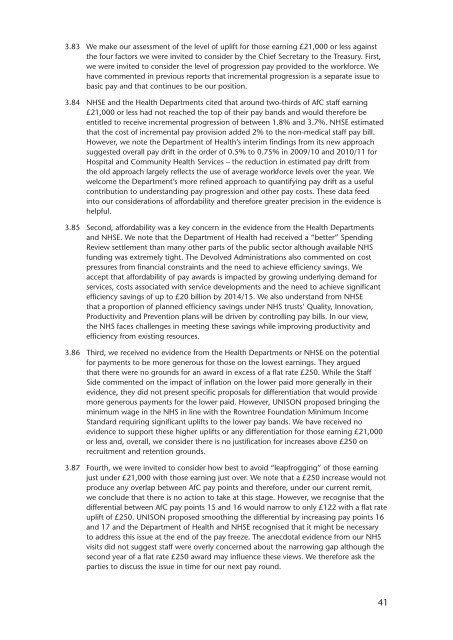NHS pay review body: twenty-sixth report 2012 - Official Documents
NHS pay review body: twenty-sixth report 2012 - Official Documents
NHS pay review body: twenty-sixth report 2012 - Official Documents
You also want an ePaper? Increase the reach of your titles
YUMPU automatically turns print PDFs into web optimized ePapers that Google loves.
3.83 We make our assessment of the level of uplift for those earning £21,000 or less against<br />
the four factors we were invited to consider by the Chief Secretary to the Treasury. First,<br />
we were invited to consider the level of progression <strong>pay</strong> provided to the workforce. We<br />
have commented in previous <strong>report</strong>s that incremental progression is a separate issue to<br />
basic <strong>pay</strong> and that continues to be our position.<br />
3.84 <strong>NHS</strong>E and the Health Departments cited that around two-thirds of AfC staff earning<br />
£21,000 or less had not reached the top of their <strong>pay</strong> bands and would therefore be<br />
entitled to receive incremental progression of between 1.8% and 3.7%. <strong>NHS</strong>E estimated<br />
that the cost of incremental <strong>pay</strong> provision added 2% to the non-medical staff <strong>pay</strong> bill.<br />
However, we note the Department of Health’s interim findings from its new approach<br />
suggested overall <strong>pay</strong> drift in the order of 0.5% to 0.75% in 2009/10 and 2010/11 for<br />
Hospital and Community Health Services – the reduction in estimated <strong>pay</strong> drift from<br />
the old approach largely reflects the use of average workforce levels over the year. We<br />
welcome the Department’s more refined approach to quantifying <strong>pay</strong> drift as a useful<br />
contribution to understanding <strong>pay</strong> progression and other <strong>pay</strong> costs. These data feed<br />
into our considerations of affordability and therefore greater precision in the evidence is<br />
helpful.<br />
3.85 Second, affordability was a key concern in the evidence from the Health Departments<br />
and <strong>NHS</strong>E. We note that the Department of Health had received a “better” Spending<br />
Review settlement than many other parts of the public sector although available <strong>NHS</strong><br />
funding was extremely tight. The Devolved Administrations also commented on cost<br />
pressures from financial constraints and the need to achieve efficiency savings. We<br />
accept that affordability of <strong>pay</strong> awards is impacted by growing underlying demand for<br />
services, costs associated with service developments and the need to achieve significant<br />
efficiency savings of up to £20 billion by 2014/15. We also understand from <strong>NHS</strong>E<br />
that a proportion of planned efficiency savings under <strong>NHS</strong> trusts’ Quality, Innovation,<br />
Productivity and Prevention plans will be driven by controlling <strong>pay</strong> bills. In our view,<br />
the <strong>NHS</strong> faces challenges in meeting these savings while improving productivity and<br />
efficiency from existing resources.<br />
3.86 Third, we received no evidence from the Health Departments or <strong>NHS</strong>E on the potential<br />
for <strong>pay</strong>ments to be more generous for those on the lowest earnings. They argued<br />
that there were no grounds for an award in excess of a flat rate £250. While the Staff<br />
Side commented on the impact of inflation on the lower paid more generally in their<br />
evidence, they did not present specific proposals for differentiation that would provide<br />
more generous <strong>pay</strong>ments for the lower paid. However, UNISON proposed bringing the<br />
minimum wage in the <strong>NHS</strong> in line with the Rowntree Foundation Minimum Income<br />
Standard requiring significant uplifts to the lower <strong>pay</strong> bands. We have received no<br />
evidence to support these higher uplifts or any differentiation for those earning £21,000<br />
or less and, overall, we consider there is no justification for increases above £250 on<br />
recruitment and retention grounds.<br />
3.87 Fourth, we were invited to consider how best to avoid “leapfrogging” of those earning<br />
just under £21,000 with those earning just over. We note that a £250 increase would not<br />
produce any overlap between AfC <strong>pay</strong> points and therefore, under our current remit,<br />
we conclude that there is no action to take at this stage. However, we recognise that the<br />
differential between AfC <strong>pay</strong> points 15 and 16 would narrow to only £122 with a flat rate<br />
uplift of £250. UNISON proposed smoothing the differential by increasing <strong>pay</strong> points 16<br />
and 17 and the Department of Health and <strong>NHS</strong>E recognised that it might be necessary<br />
to address this issue at the end of the <strong>pay</strong> freeze. The anecdotal evidence from our <strong>NHS</strong><br />
visits did not suggest staff were overly concerned about the narrowing gap although the<br />
second year of a flat rate £250 award may influence these views. We therefore ask the<br />
parties to discuss the issue in time for our next <strong>pay</strong> round.<br />
41
















